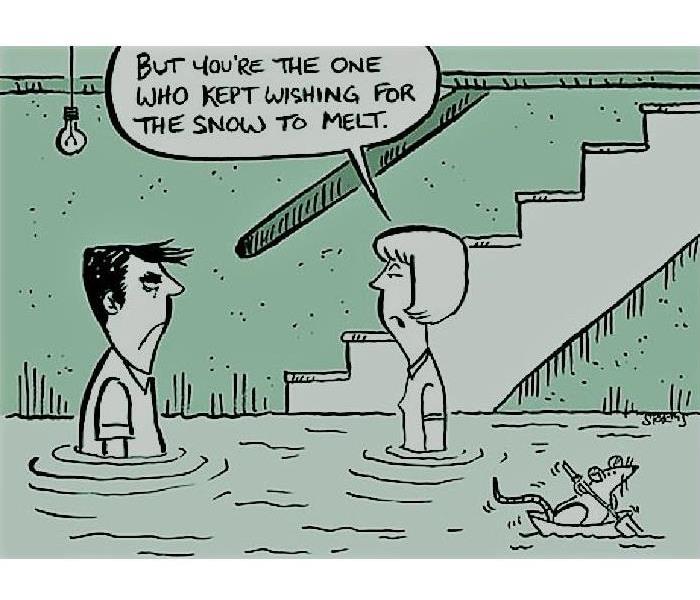Spring is Just Around the Corner in New Haven County!
3/5/2019 (Permalink)
 We are all looking forward to springtime in Connecticut but the warm temperatures can mean basement flooding to homes and businesses.
We are all looking forward to springtime in Connecticut but the warm temperatures can mean basement flooding to homes and businesses.
Trust us. Despite the snow that fell this week in the Woodbridge, CT area, spring really is just around the corner.
The shining sun outside today is giving us all a little hope and if you are like us, you are ready for this winter to end! Between the single digit temps, heavy snow, several thaws and heavy rain, we’ve worked for months mitigating water damage and flooding from frozen pipes and ice dams. As a water damage restoration company, we know that the coming of spring does not mean an end to water damage in area homes and businesses.
Warm temperatures thaw the ground, creating a soggy, uneven surface. When the snow melts, puddles form and the ground becomes so saturated that flooding occurs. In particular, we see quite a bit of basement flooding in March and April due to water seeping through leaks and cracks in the foundation. Basement damage can happen quick and can be unexpected - occurring even in a basement that has previously remained dry. Unless you keep your basement empty, the flooding will not only cause structural damage, but also cause damage to your belongings. In addition, basement flooding can create the ideal environment for mold and mildew growth.
So what’s a homeowner to do to avoid water damage during the spring thaw?
There are a few steps that you can take to reduce your risk of flooding.
Ice Damming
Ice dams are not only a concern during the winter months. Because ice dams are a problem when the weather warms and the ice melts, they are troublesome during the early spring. Careful removal of snow off of your roof with a roof rake after snow falls (and hopefully when it is still light and fluffy!) will prevent ice dams from forming and causing water damage inside your home.
Melting Snow
The best way to keep melting snow from making its way into your basement is to grade the ground closest to your foundation. Build up the soil in order to have at least a six-inch slope from the foundation to at least ten feet from the property to keep water from seeping into the foundation or basement.
Clogged Gutters
Clogged gutters can cause water to spill over the side, down the walls of your home and seep into the foundation. Make sure your gutters are free of debris to ensure proper water flow. Properly install downspouts and extenders to direct runoff away from your home. Because your gutters are your first line of defense, houses without, or with clogged, gutters often have leakage problems caused by water splashing against the foundation. You can also dig a plastic lined trench to divert the runoff from the roofline.
As we all look forward to the warmer months, keep in mind that we aren't in the clear yet from water damage!





 24/7 Emergency Service
24/7 Emergency Service